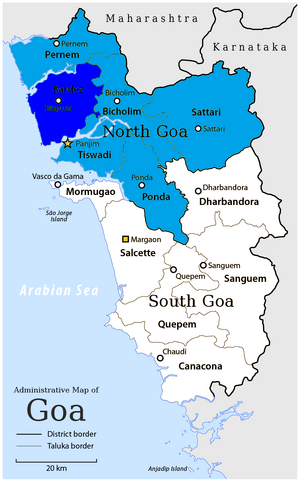Ponda
| Author:Laxman Burdak, IFS (R) |

Ponda (पोंडा), also known as Fonda, is a city and a municipal council in the South Goa district of Goa, India.
Variants
- Fonda
- Goan Konkani: फोंडेें, phoṇde;
- Portuguese: Pondá
- Antruz Mahal
Location
Ponda lies along the National Highway 4A, which connects Panaji to Belgaum in the neighboring state of Karnataka. Located in the central area of Goa, Ponda lies 28 km (17 miles) southeast of Panaji, the capital of Goa and 17 km (10.6 miles) northeast of Margao, the district headquarters.
Jat clans
History
Ponda is also known as "Antruz Mahal" because of the presence of numerous famous temples and rich cultural heritage.[1]
Ponda formed part of the Novas Conquistas (New Conquests) of Portuguese India. It was ruled by the Sonda Rajas under the Vijayanagara Empire and the Bijapur Sultanate. In the 16th century, due to the absence of the Portuguese, Ponda was a safe haven for Hindus fleeing persecution by Jesuits and the Portuguese. In 1675, Shivaji seized Ponda from the Bijapur Sultanate. It remained part of the Maratha Empire until 1764. Under Shivaji, Saundekar Raja was the vassal of Ponda.
The forests of Ponda were ideal places for Hindus to form makeshift temples with the idols they had salvaged from the broken temples of Sashti. These makeshift temples were slowly renovated as the Hindus gained prosperity. Now, most of the major Hindu temples in Goa are found in Ponda.
In June 1756 Luís Mascarenhas, Count of Alva (Conde de Alva), the Portuguese Viceroy was killed in action by Maratha Army in Goa. The Portuguese eventually took over the area in 1791 from the Raja of Sonda, along with Quepem, Canacona and Sanguem. It began as an administrative center with the establishment of administrative offices and court, and soon became a commercial center. Most of the area known as Ponda today was a part of Kavale village. Ponda continued to have a Hindu majority even during Portuguese rule. Ponda was known as Antruz Mahal during Portuguese rule.
List of Villages in Ponda tahsil
1. Adcolna, 2. Bandora, 3. Betora, 4. Betqui, 5. Boma, 6. Borim, 7. Candepar, 8. Candola, 9. Codar, 10. Conxem, 11. Cuncoliem, 12. Cundaim, 13. Curti, 14. Durbhat, 15. Gangem, 16. Marcaim, 17. Nirancal, 18. Orgao, 19. Ponchavadi, 20. Priol, 21. Quela, 22. Querim, 23. Savoi Verem, 24. Siroda, 25. Telaulim, 26. Tivrem, 27. Usgao, 28. Vadi, 29. Vagurbem , 30. Velinga, 31. Volvoi,

